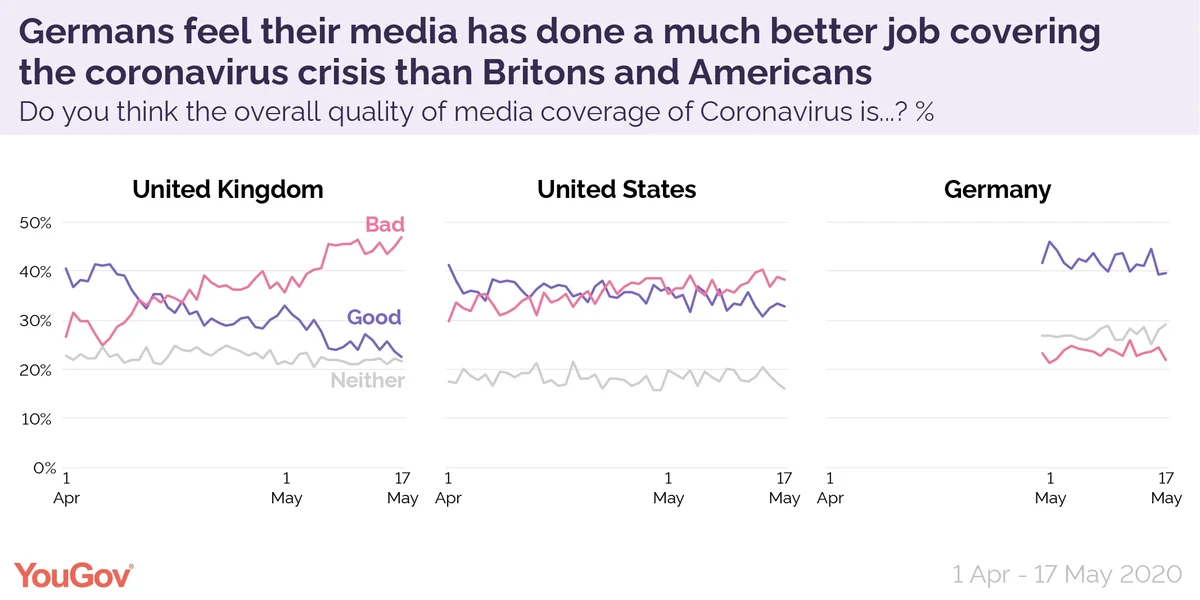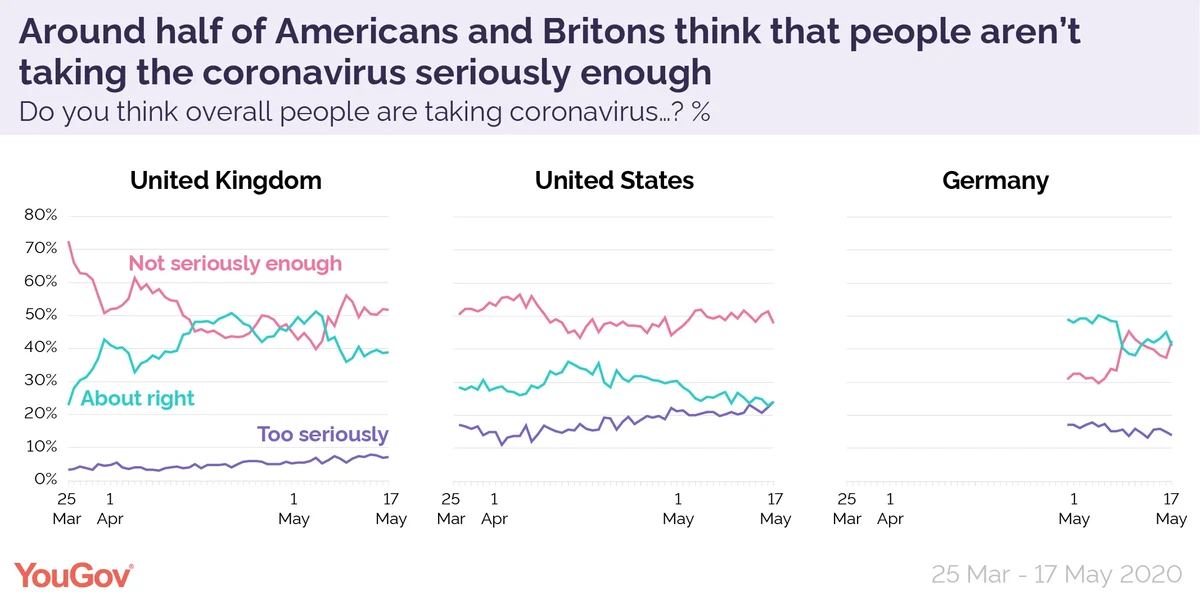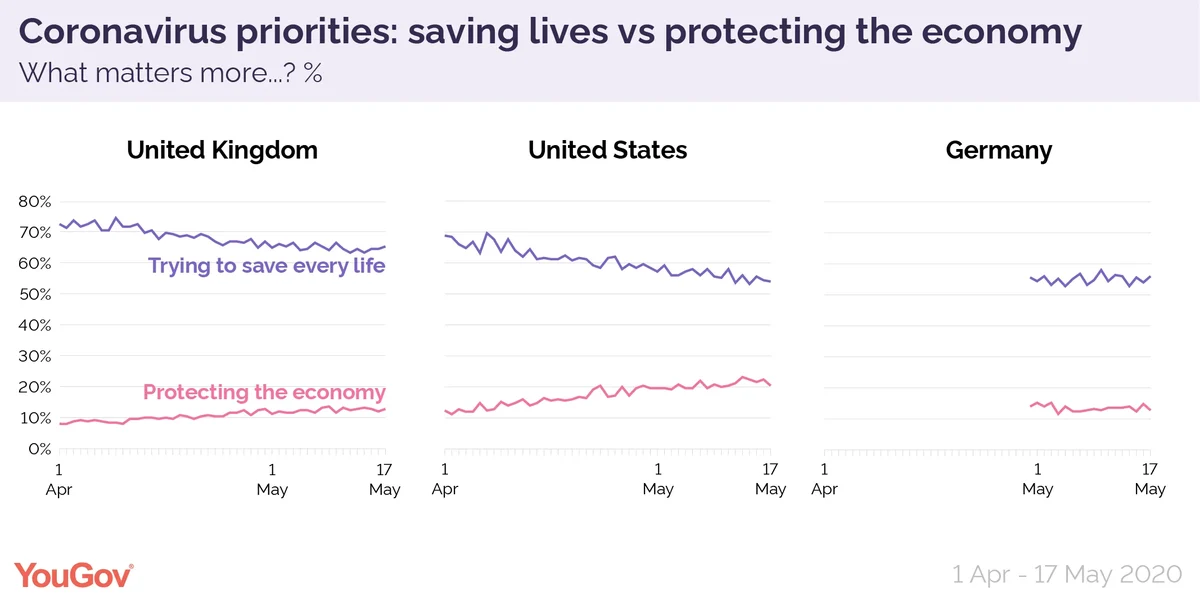A YouGov tracker compares the three countries
YouGov has been tracking attitudes to coronavirus in Britain since lockdown began on 23 March, with our US tracker starting a few days later on 26 March, and in Germany on 30 April. We’ve rounded up a few key comparisons between the three countries.
Media coverage of coronavirus
On 1 April when the UK tracker for this question began, Britons actually tended to think the quality of media coverage of the coronavirus crisis was good, with 41% saying so compared to 27% who thought it was bad.
This state of affairs continued for about a week, at which point sentiment started to decline, with crossover taking place on 11 Apr when 34% of people said the quality was good and 35% bad.
The situation has only become worse since then, and by the time of the most recent tracker the proportion of Brits saying the quality of media coverage has been bad has reached 48%. Only 23% now think the media are doing a good job.

In the US too Americans started out with a more positive than negative view of the media: on 1 April 41% had a high opinion of the quality of coverage compared to 30% who had a low one. For most of the time since then, Americans have been largely split on how good the quality of coverage has been, although starting from the second week of May there has been a clear ‘bad’ lead. The most recent result shows 39% think coverage quality has been bad compared to 32% good.
In Germany, by contrast, there is a much more positive view of the media. While our German tracker only began on 30 April, for the entire time period the number who think media coverage has been good far outnumber those who think it has been bad. At the most recent count 39% of Germans label media coverage “good”, compared to only 22% who think it is “bad”.
Public perceptions of how seriously people are taking the outbreak
On 25 April, just two days into the UK lockdown, Britons overwhelmingly believed that people weren’t taking the crisis seriously enough, with 73% expressing such a view.
That figure rapidly dropped to around 50% by early April, before rebounding to around 60% a week later. It subsequently started to fall again, and in mid-April the number thinking the public weren’t serious enough fell below the number thinking they were taking things with an appropriate level of seriousness.
Since that point these two figures have criss-crossed, but since early May a wide gap has once again opened up with more than half of Britons once again believing their fellow countrymen aren’t taking the outbreak with the seriousness they should.

In the US, this opinion has always been the most common. For the entire time around half of Americans have felt people aren’t taking the disease seriously enough. The proportion who think they are has generally been closer to 30%.
And since early April the proportion of Americans who think people are taking the pandemic seriously has been rising slowly but surely, and on 17 May reached parity with the number who think public attitudes are about right, at 24% apiece.
Our German tracker started on 30 April, and for just over a week there was a large gap between those who thought citizens were adequately serious about the crisis (48-50%) and those who believed people weren’t being serious enough (31-34%). On 9 May this gap suddenly vanished, with the adequate figure falling to 40% and the not serious enough figure jumping to 42%.
For a short period Germans were more likely to believe people weren’t being serious enough, followed by the reverse situation for about a week. As of the most recent survey, the figures are about tied.
Prioritising saving lives vs economics
Faced with the choice between trying to save every life and protecting the economy, Britons are the most likely to opt for the former. Almost two thirds of Britons (65%) in the most recent survey said they would prefer the government focus on saving lives, compared to 56% of Germans and 54% of Americans.
By contrast, only 13% of Britons prioritise the economy, a figure identical to that in Germany, and compared to 20% of Americans.

That being said, it is worth noting that in both America and Britain opinion has been slowly moving away from saving lives and toward protecting the economy. At the start of April the proportion of Brits wanting to save lives was eight percentage points higher, and likewise in the US it was fully 15 points higher.
Figures in Germany remain largely unchanged over the shorter time period we have been tracking attitudes there.
Economic recovery expectations
Americans are the most likely to think the economy will bounce back quickly after the crisis, with almost a quarter (24%) feeling this way at the last count. This is twice the figure in Britain (12%), with Germans in between at 19%.
Germans, however, are the least pessimistic that the economy will be damaged in the long term. Only a quarter (24%) feel this way, compared to 30% of Americans and 39% of Britons.
Perceived likelihood of catching the disease
More than a third of Americans (37%) consider themselves unlikely to catch coronavirus, compared to 28% in Germany and 22% in the UK.
Germans are more likely to feel confident that they would recover from the virus, should they catch it. Almost three quarters (73%) are very or fairly confident that they could shake it off, compared to 65% of Americans and 62% of Britons.









